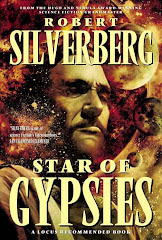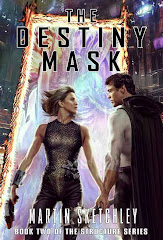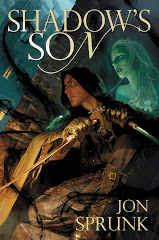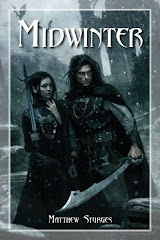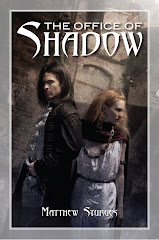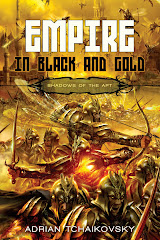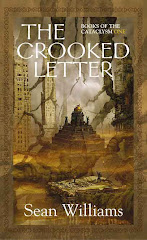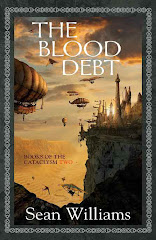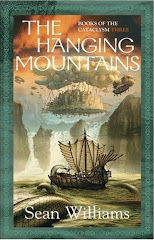 James Enge's Blood of Ambrose, is an epic swords and sorcery novel starring his enigmatic creation, Morlock Ambrosius, wandering swordsman and master of all magical makers. Before his novel debut, Morlock already featured in many works of short fiction appearing in the pages of Black Gate and elsewhere.
James Enge's Blood of Ambrose, is an epic swords and sorcery novel starring his enigmatic creation, Morlock Ambrosius, wandering swordsman and master of all magical makers. Before his novel debut, Morlock already featured in many works of short fiction appearing in the pages of Black Gate and elsewhere.The following tale, "Fire and Sleet," is an original novelette offered here for the first time anywhere. Although it stands on its own and makes a wonderful introduction to Enge's fascinating character, it is also a sequel of sorts to "A Book of Silences," also appearing on this blog. Read and enjoy!
James Enge
Riding through the woods on the road to Aflraun, two days before his violent death, ancient Bleys the Summoner reined in and looked up at the cloud of black branches that obscured the sky.
"Is that you, Morlock?" Bleys asked, speaking to a twisted figure perched among the twisted limbs of an oak.
"Yes." Morlock Ambrosius' cool voice betrayed a trace of impatience. "Ride on, please."
Bleys was possibly the oldest man in the world, and he had once been Morlock's senior colleague, back when Morlock was a member of the Graith of Guardians who protected the Wardlands. That was centuries ago; they were no longer colleagues and were now deep in the unguarded lands. But Bleys saw no reason why he should now take marching orders from Morlock. He pointedly ignored the younger man's request and asked, "What in the world are you doing up there?"
"Bird watching."
A pause, while Bleys digested this unexpected response. "But you're in full armor," the older man observed finally.
This was an exaggeration. Morlock had no helmet or greaves, but his crooked torso was armored
by bands of enameled metal or black leather.
"Unusual bird," Morlock replied.
"Must be," Bleys agreed.
"Are you riding on to Aflraun?" Morlock asked.
"No. I'll be stopping at the next town."
"That would be Semendar. I have a room at the Crowfeather Inn there. Perhaps I'll see you."
Bleys nodded indifferently and rode on.
When he reached the outskirts of Semendar he was immediately hailed by a stranger, a shortish man with a manner both abrupt and insinuating.
"I suppose you are here for the hunt, master," the stranger said to Bleys.
"Suppose I am," Bleys said.
"Then you've come to the right man."
"I didn't come to you. I was going to ride past you."
"And ride past your best chance to achieve your quest? Not if I know you."
"You don't."
"Not if you're half as shrewd as you look," the stranger corrected himself.
"I'm not," said Bleys, thinking it was a poor compliment.
"Look at this, then," the stranger said, as if the matter was settled. He held up an orb woven of steel bars which looked rather like a birdcage. "I call this the Birdcage."
"I can see why."
"But of course it's not for the bird--it's for you. A protective mask, as good as any steel-visored helmet, but still giving you the full range of peripheral vision. I don't have to tell you, that can be the margin of survival in a business like this. Of course, it's practically useless without shoulder-guards and a cuirass. Now I have a set here which--"
"Looks used."
"Well. It has been used. And, in fact, the, er, customer in question--"
"Nearly survived, but not quite."
"He didn't have your magical ability, master. I don't pretend to be able to provide protection against fire and other abilities of the bird. Because this is a return, as it were, I can offer it at a special price--"
"Knock it off," Bleys said wearily. "You stripped that armor off a corpse you found somewhere."
"And buried the meat, and dragged the stuff back to town, and cleaned the blood off it, and now nobody wants it. Just because it has a few… wear-marks on it."
"I don't want it either," Bleys said. "But I'll give you a finger of silver if you tell me how to get to the Crowfeather Inn."
"On the main drag; keep straight on. It'll be on your left. Sure you don't want the stuff?"
For an answer Bleys tossed him a finger of silver and rode off.
Callion the Proud was sitting with Noreê at a table in the crowded tavern of the Crowfeather Inn. There was another man seated with them, but he leapt up and rushed off as Bleys approached.
Callion was tall, dark-haired, marble-faced. He had a gift of stillness and often, as now, he looked to Bleys like a statue carved by some remarkably talented sculptor. But anyone who mistook that slowness for stupidity would soon regret it; Callion could act swiftly and shrewdly when occasion offered.
Noreê looked like a statue, too--perhaps carved by the same sculptor, but in his cynical old age. She, too, was beautiful, but wounded by the world. It showed by the scars on her pale face, but almost as clearly in her pale eyes. Her hair was pale, too--whiter than most winter days.
He slid into a chair beside Callion. They nodded to each other in greeting.
"Morlock has a room at this inn," Bleys observed. "I take it that's why you're here?"
"Yes," Noreê said. "How did you find out?"
"I ran into him, west of town. He was armored, sitting up in a tree--looking for a bird, he said. I thought he might be crazy, but if so this whole town is crazy."
"There's a phoenix somewhere around here," Noreê explained. "The local baron has offered a reward for its capture. And, of course, some sorcerers hope to capture it for their own purposes."
"Ah, of course," Bleys nodded. An immortal being had potentially many magical uses. Of the fifteen longevity spells Bleys knew, seven or eight involved the blood of a phoenix. "Well, that's convenient, in a way. It gives us a reason for being here."
He meant, as they understood, a reason apart from their real reason. For they had come here, not to hunt the phoenix, but to kill Morlock Ambrosius.
"Hello hello hello," said an almost oppressively cheery voice in Bleys' ear. "Another friend of Morlock's?" Bleys turned to see the stocky balding man who had been sitting at the table when he had first entered the tavern. The innkeeper, Bleys guessed. "What can I get you to drink?" he asked, confirming Bleys' guess. "Morlock doesn't drink himself, as you know, but he doesn't mind if people at his table do."
"Some red wine, if it's any good, sir."
"It's swill--not the best swill, either. Only the white wine is drinkable hereabouts. Or I might recommend the beer."
"A mug of the white, then, sir; thanks. I'm Bleys, by the way."
"I'm Korax. This is my place. Any friend of Morlock's is a friend of mine--I don't care what anyone says. I'll be back."
"So we are friends of Morlock's are we?" Bleys said wryly, when they were alone.
Callion shrugged, uncomfortably. "It got us a table, which Morlock apparently has reserved from the innkeeper by paying some exorbitant sum. And we'll have to observe him a while before we try anything. We can't just jump him in a dark alley."
"I agree. Quite apart from the morality of it--"
"Morality be damned," Noreê said crisply. "People who try that with Morlock don't prosper."
The room, already crowded, was filling up with people. Through the windows, Bleys saw that the sun was setting; apparently people were giving up phoenix-hunting (or the pretence of phoenix-hunting) for the day. No one offered to sit at their table, although there were several unoccupied chairs. Apparently custom made it sacrosanct.
Korax returned with some white wine in a frigid mug and a tankard of beer for himself.
"This is a fine vintage," Bleys observed, after a cautious sip. "How do you keep it so cold?"
Korax shrugged, sitting. "Some gadget of Morlock's. It does make the stuff taste better. He lined my drinking cups with something like glass, too, but less fragile. It makes the cups easier to wash, and doesn't give a tang to the wine, the way metal does. The joke is, he never drinks wine or beer himself. Says it's like poison to him."
"He's a useful tenant," Bleys observed.
"He's a good friend," Korax replied. "I don't believe all those stories the Southerners tell about him." He speculated for a few moments about the climate which prevailed south of the Whitethorn Mountains and why it had the peculiar effect of making people such damn liars.
A strikingly beautiful woman with brown skin and dark golden hair entered the tavern. She went to speak to the barkeep. Turning to leave, she glanced at Bleys, Callion and Noreê sitting at the table. Her golden eyes were unreadable; she turned away and left the room.
Callion was blushing, an ugly shade of purple. "Awkward," Bleys remarked, to no one in particular, and sipped at his wine.
"Do you know her?" Korax said, with the impolitic interest of an innkeeper. "I wish I did. Never saw her around before today. Doesn't look like your average phoenix-hunter, 'scuse my mentioning it."
"What does your average phoenix-hunter look like?" Bleys wondered.
"Oh, maybe there isn't just one type, but she doesn't seem to fit any of them. There are the tricksters and cut-purses, who are no more hunting phoenixes than I am; there are the would-be sorcerers, who aren't usually so different from the tricksters; there are the would-be heroes, who tend to cycle through pretty quickly. One encounter with the beast and they either take to their heels, or they come back missing something, often something rather useful, if one is going to continue breathing. Then there are the merely desperate, who want to earn the bounty posted by Semendar's Old Men."
Bleys wondered wryly which category, or categories, Korax had assigned to himself and his companions. Noreê was staring off into the tavern room, where a group of gowned men standing by the fireplace were arguing about something.
"Ha!" said one, "but can you do this?" He shook his hand; it turned into a blood-red bird and flew around the room. Landing on his wrist, it became a hand again.
"I can do this," retorted another, weaving his hands through a mystic set of gestures. The bottles and cups on the bar immediately began to hop about, singing a comic song in a language no one in the tavern knew.
"Don't magic my stock!" roared Korax. "It never tastes the same afterward," he explained to Bleys, in a somewhat more civilized tone. "Excuse the nightly pissing match," he added. "They won't be at it long."
"But I can do this," another of the gowned men cried. He did not speak or gesture, but suddenly there was a light outside the windows, and everyone in the room felt almost as if it were yesterday morning.
"Yeccch," said another of the gowned ones, as the light faded. "Mere nostalgia. What of real power? Try this, if you can!" His eyeballs popped out of his head and began hopping about the room.
Unfortunately the sorcerer's control over his roving eyes was less than he had supposed. Once they landed in someone's drink, causing the sorcerer to scream in pain, and once they became tangled in a prostitute's hair, causing her to scream with annoyance. She threw them from her and they were bouncing toward the open tavern door, with the eyeless sorcerer scrambling after them, when a dark man with crooked shoulders appeared in the doorway. He caught the eyeballs in his left hand and tossed them deftly into the groping sorcerer's empty eyesockets.
"Ah, Morlock," Korax said, rising to greet the newcomer. "My guests were just amusing us with some displays of magical power. Surely you have something to show us?"
Morlock, his dark face impassive, reached into his black cloak with his right hand and drew forth a deck of cards. He slipped off their band and cut them twice, using only one hand.
The sorcerers turned away, abashed. Korax applauded loudly saying, "The best trick of the evening! Come, let's have a hand or two, Morlock. Perhaps your friends will sit in."
Morlock's gray eyes, almost luminously pale against his dark weather-beaten face, glanced at the people sitting at his table.
"Bleys. Callion. Noreê. Good evening," he said, approaching the table and sitting down without ceremony. "You have drinks, I see. Korax, be sure to put those on my bill."
"It's nothing--I was going to put them on my sleeve, as it were. Don't you want to eat?" Korax added, for Morlock was already shuffling the cards.
"I'm not eating tonight," Morlock replied, sending the cards from hand to hand in a continuous stream. "I think the phoenix can smell your wife's fine cooking on me."
Korax guffawed, but said, "But you have to have something. You've been out all day."
"And I'll be out all night. Perhaps you could let my friends--" he nodded toward Bleys, Callion and Noreê "--use my room for the night. You'll find it cramped," he said to Bleys, "but you're not likely to get anything else in town."
"You're most generous," Bleys murmured, hoping he didn't look as uncomfortable as Callion did. It was awkward to accept the hospitality of someone you were planning to kill. Noreê, on the other hand, didn't seem upset. She was staring at Morlock with cool distaste, as if he were something floating in her drink.
"You have to have something," Korax insisted. "Water, at least."
"No," said Morlock, shaking his head. "I just came in to collect my thoughts and perhaps play a game of cards. Won't you join us?" he asked Bleys and the others.
"Don't worry about his deftness with the cards," Korax said. "He doesn't win any more when he's dealing than he does when he's not. And he doesn't win much, as a matter of fact."
"We don't know your game," said Bleys, not liking to say no.
"It's called Pookah," Morlock said. "The rules are simple, but there are a few tricks to it." He dealt the deck out, face up, showing them the four suits (cups, swords, pentacles and wands), the ten numbered cards for each suit (from ace to ten) and the face cards for each suit (knave, knight, queen and king). Then he proceeded to explain the rules for Pookah or (as it later came to be called) Poker.
"Those are the basic rules," he said, in conclusion. "There are a few others, but maybe it's best to explain them in play."
Bleys met the eye of Noreê and then Callion. They both nodded imperceptibly. No doubt they had decided, as Bleys had, that the game would give them a chance to observe Morlock and learn what he was up to, these days. They more they learned about him the more successful their final attack was likely to be.
Morlock shuffled the cards and dealt. They played for small stakes, and Korax won the first hand. Then Korax dealt and Callion won, to his own evident surprise. Bleys took the cards, somewhat reluctantly, and dealt. There was some power in the deck that he didn't quite understand. But play proceeded without anything odd happening. This hand Noreê won, with a flush of cups.
The beautiful dark woman with golden eyes returned. She started toward the bar, gave a golden glance at the table and stopped.
"Who is that woman?" Korax muttered under his breath.
"My ex-wife," Morlock said grudgingly.
Korax looked at him with a mixture of scepticism and respect. "Oh?"
"Stress the ex," Morlock admitted.
The dark woman walked toward the table and seated herself without waiting for an invitation. "I want to speak to you, Morlock," she said.
"Raise you three," said Morlock, tossing five fingers of copper into the Pookah's pot. "Speak freely, then. You're among friends."
"You are not my friend," she said earnestly. "You're my sworn enemy!"
"I took no such oath," Morlock replied evenly. "Korax, this is my ex-wife, Aloê Oaij, Vocate to the Graith of Guardians. Aloê, meet Korax; this is his house."
Korax would have said something courteous but Aloê ignored him. "Now, Morlock!"
"At the moment," Morlock pointed out, "I am playing cards. You may join us, if you like; we can talk privately later on, if you insist."
Aloê's golden eyes glared at her former husband, then she glanced at the cards. "Another one of your little inventions, I suppose," she said.
Morlock explained the basic rules, and Aloê sat in on the next hand. Play continued, with everyone more or less breaking even, until Morlock dealt again.
From the first, Bleys felt there was something odd about that hand. The five cards arranged themselves in his hand: knave, knight, queen, king and ace. They were all from the suit of swords. Slowly Bleys realized this was a very good hand indeed. He strove to keep his face expressionless--to preserve a "Pookah face" as Korax called it.
But then he realized there was no point to that. He could not move his face--he could not move any muscle of his body by an act of will. He went on breathing; his heart went on pumping; but he could not move. He could only stare at the faces, whose eyes no longer seemed to be inked on the pasteboard cards. The eyes were pale gray, almost luminous--just like Morlock's!
"Morlock!" said Korax, sounding as alarmed as Bleys had begun to feel, "what are you doing?"
"I have seized control of my four friends, here," Morlock's voice said.
"That seems unfriendly, at best."
"Well, our friendship is of an odd sort."
"It also seems to violate the rules of the game."
"By no means, Korax. The rules of the game make it possible. Each of my friends has drawn a royal flush. Whenever that happens in Pookah, another player can gain access to the lucky player's mind."
"What?" roared Korax. "You never told me that!"
"No, it's a rule that rarely comes up. But it is, nonetheless, in the original rules I set up for the game. It was, what--five or six years ago that I first stayed here and left a deck of cards behind."
"Seven."
"All right. In that time, have you ever drawn a royal flush?"
"Once."
"What happened?"
"The other players folded. Instantly. I assume my face gave me away."
"Possibly. But not necessarily. They may have, briefly, read your mind. An adept with certain skills could seize a measure of control at that point."
"Damn it!"
"Well, you can set up house rules that exclude this one."
"I damn well will. But how did all four... Oh."
"Yes, I stacked the deck."
"Morlock, this is abominable. These people are your guests and mine. You can't treat them this way."
"I don't intend to harm them, Korax. But it was necessary that I make certain things clear to them. You see before you, Korax, four great ones of the world. Bleys here was my father Merlin's first teacher in the magical arts. Callion is one of the greatest swordsmen in the world--perhaps the greatest, since my old master Naevros syr Tol… died. Noreê is the hero who walked with Illion against the Dark Seven of Kaen. I will not sing Aloê's praises here; we would both find it embarrassing. The gist is that they are all Guardians of the Wardlands, where I was born and from which I was exiled long ago. I had occasion to return there lately, breaking their laws. Had they been able to do so, they would have killed me at that time."
"Eh? Why did you go there, then?"
"I had my reasons. Bleys, what of it? Did you come here to kill me? I will not compel you to speak, but I forbid you to lie."
Bleys found himself able to speak, but chose not to.
"Noreê," Morlock continued, "we are old enemies. I won't ask why you're here; I read it in your face as soon as I stepped through the door. Callion, though, you surprise me. I suppose you were drawn here by Noreê; if you ever had a weakness, it was to let your latest sweetheart do your thinking for you. I invite you to think for yourself. I left the Wardlands and returned to exile of my own free will; I don't plan to enter there again. Am I really a threat to the guard you would maintain over the Wardlands? Is your mission here just? Speak if you like; I forbid you to lie."
The rules which gave Morlock mastery over their wills allowed a certain rapport among them all. Bleys felt Callion's shame and confusion; the younger man almost spoke, but in the end did not.
"Aloê, then," Morlock said. "You had something to say to me. Speak now, if you wish, but do not lie."
"I hate your guts, you crook-backed bastard!"
"Enough about you, then," Morlock said calmly. "Let's talk about me. As we sit here I hold your lives in my hand. If I refrain from killing you now, it is simply because I choose not to do so.
"But I warn you: give up this attempt. If you try to harm me, I will strike you without further warning and without any pity. Give this up. Go home to the Wardlands and keep them from danger. It is what you were born to do."
Morlock tossed his cards on the table and said, "This game is over."
The Guardians, their wills suddenly freed, leapt to their feet. Morlock remained sitting, his hands open and still, waiting.
"Morlock," Bleys said at last, "you misjudge us."
Morlock shrugged his crooked shoulders. "I doubt it. But it doesn't matter. If you are my friends, I will be yours. If you try to harm me, I will harm you. Korax, show them to my room, won't you?"
Korax stared at him blankly, then shrugged. "Sure. But you're a weird bastard, Morlock. Maybe there's some truth to those southern legends after all."
"There is some," Morlock admitted, "but not much." He stood and gathered the cards up and, sliding the band on them, pocketed the deck in his cloak. Nodding farewell to them all, he walked away and out into the night, where a cold rain, mixed with sleet, had begun to fall.
Korax led the way up to Morlock's room without a word. There was no lock on the door; none of them was surprised: a maker of Morlock's ability would have surer protection than locks.
"I don't care what Morlock says," Korax said, as he closed the door behind them. "Tomorrow I want you out." The door shut.
"I'll take the bed," Aloê said distantly. "Noreê and Callion can hump on the floor, if they like. Bleys: drop dead."
"Don't be vulgar, my dear."
"Your sensibilities are rather refined for an assassin."
"I never admitted that, my dear."
"You didn't take the chance to deny it."
"Nor did you."
"Morlock knows I'm not here to kill him, just as he knows I wouldn't hesitate to do it if he set foot in the Wardlands again. I just came to give him fair warning that you were coming for him."
"Why should you take the trouble, my dear? Lingering feelings for the crook-backed bastard?"
"Lingering feelings of self-respect. Do I have to map it out for you? How did you find Morlock, in all the length and breadth of the unguarded lands? The best method for finding someone involves an amount of their blood. You couldn't get that. Next best is the blood of their life-mate, because mate changes mate as two become one. You couldn't get that, either, although I remember you tried it a few times. The third method is to use blood from someone who has slept with the person's life-mate; those-who-know tell me there will be a brief kinship of blood, on which a pursuer-spell can be based."
She turned her golden glare on Callion, who did not quite meet it, his face twisting with shame.
"Well, a fat lot of good it did you," she said. "He saw you coming and trapped you like rats. You'd better heed his warning. If you don't, your deaths won't be avenged by the Graith of Guardians. I'll see to that."
She shouldered past them and climbed into bed. "Hump all you want," she said over her shoulder, "but do it quietly. I've had a long day."
Noreê and Callion slept on the floor in the same cloak, but refrained from any noticeable humping. Bleys spent the last full night of his life in an armchair, reading with great interest a workbook from Morlock's pack. Towards dawn, he nodded off. When he awoke, a couple hours later, all of the younger Guardians had left the little room.
Bleys found Morlock wrapping himself around some ham and eggs in the tavern room. They greeted each other with a nod, and Bleys sat down at Morlock's table.
"Any luck?" Bleys asked.
Morlock shook his head and swallowed what he'd been chewing. "It was a long shot," he said. "Phoenixes don't like rain, especially rain mixed with snow."
"Who does?" replied the oldest man in the world irritably. He added, in a calmer tone, "I read a workbook I found in your pack last night. It was written by someone who called himself Flegyas. I take it--"
Morlock nodded, "The local phoenix was his. It killed him and got away. Not necessarily in that order."
"And you knew him?"
"Flegyas? Only post mortem."
"Then why are you running about, finishing up his unfinished business?" Bleys demanded. "What do you want a phoenix for?"
Morlock ate a mouthful, met Bleys' eye and shrugged. He ate another mouthful without saying anything.
"I take it you're not going to answer?" Bleys asked.
Morlock nodded.
Annoyed, Bleys got to his feet and walked away.
Outside the signs of last night's rain had almost disappeared. The wind was chillier than the day before and the dark low-hanging clouds promised more rain and snow.
"Delightful," muttered Bleys, who had promised himself he would spend this winter in the islands off the Wardlands' southern coast, where it rarely, if ever, snowed. Well, maybe next year, he thought, without much hope.
He found Callion and Noreê in a heated discussion outside a nearby inn, whose sign was carved into a shape slightly resembling a pig's head.
Noreê turned to Bleys as he approached. "Callion wants to give up," she said, her voice as cold as the wind.
"And you want...?" Bleys said.
"To finish the job. Today. Morlock spent the night in the woods and he's exhausted. One of us should go up to his room and stab him as he lies sleeping."
Bleys raised the skin where his eyebrows would have been, if he'd had any hair left at all. "And you really think that will work?"
"Of course it will. He has you all dazzled, but it's only smoke and mirrors."
"Well, I strongly caution against your plan. I will not engage in any such reckless activity. It seems to me your dislike of the man, which I thoroughly understand and even approve, is leading you astray. He will certainly take steps to prevent any such elementary attack."
"So you want to give up, too?"
"Certainly not. I doubt that Callion does either. Malice makes you stupid, my dear--you want to watch that. I simply say: instead of striking at a time when he expects it and when he has taken precautions to prevent us, we should strike at a time when he is preoccupied and he cannot take precautions to prevent us. We should, in short, hunt him while he is hunting the phoenix."
Noreê shrugged. "It isn't a matter of either/or. I can make the attempt on him today. If it fails, we can still pursue him tonight."
"But if you fall prey to his precautions, my dear, we will be one less tonight."
"Nonsense. I'm no novice. If he has guard-spells set in place, I'll perceive them. If I can't obviate them, I'll refrain."
Bleys shrugged, doubly unhappy because of the chill wind and the conversation. "I wish I could dissuade you. Good luck, of course. Did you have any luck in the Swine's Head, or whatever this place is?"
Two rooms, as it happened, had fallen vacant the night before: their tenants had either met the phoenix, or decided to stop trying. Noreê and Callion had rented both. Bleys was tired and expected a long night, and so went up to one of the rooms to sleep.
Around noon, Noreê set out to kill Morlock.
She had been thinking about this moment for many years. In fact, she had always felt the world would be a better place without any of the Ambrosii. But her mind had only turned to killing Morlock with her own hands when he destroyed Naevros syr Tol. For some of Noreê's peers it was enough to have banished Morlock from the Wardlands, but she longed for a more concrete vengeance. The longing had flowered into obsession when she heard that Morlock had actually dared to re-enter the Wardlands. Death was the penalty for those who returned from exile, and death should have been dealt to him then, but as usual he weaselled out of the danger and fled into the unguarded lands.
The moment she heard of this she knew she would have to dispose of Morlock herself. That was what led her to join with Bleys--not normally one of her allies in the Graith. But her titanic will, having set on a certain course, would yield to nothing but itself. She had done many things that had made her ashamed since then. When her attempts to gain the necessary vial of Aloê's blood had failed she had seduced Callion the Proud and then enlisted him to seduce Aloê. While his blood was still warm from Aloê's, Noreê had drawn it from his veins and worked the magic that would lead them to Morlock. She had been ashamed by it, so deeply shamed that she could hardly look Callion in the eye anymore. But she had done it.
Now she, the hero who had walked openly through the Broken Gate to confront the Dark Seven of Kaen, was creeping up the narrow stairs of a crooked little house in the unguarded lands, planning to stab a man while he slept. She felt the strangeness of it. She no longer had much in common with that younger woman who had sailed across the Narrow Sea to Kaen. Morlock was a poison in her that had to be purged, a tumor that had to be cut out, so that she could have again the clean cold heart of the young hero she had been. This had to be done, so she would do it. If shame was the price of success, she would pay it.
Only success could justify what she was about, though, so she took every precaution. She sat down on the dirty stairs below the door to Morlock's room and summoned the rapture of vision, sending her mind into the tal-realm between spirit and matter. If Morlock were surrounded by a protective web of spells, her visionary self would see them, and she could set about circumventing them.
She found herself almost hoping that there would be spells and that they would prove impenetrable. Then she would have a reason for retreating. Then, when the time came to kill Morlock, there would be others with her, the guilt would be shared...
The moment she detected this thought she snuffed it out. She didn't believe in shared responsibility. If this thing was worth doing, it was hers to do. If she could do it, the burden was hers to bear. That was the code by which she had lived her life, and she saw no reason to abandon it now simply because she was planning a murder.
There were no spells of any kind on the stair, at the doorway or in the room, as far as she dared explore it. If her visionary presence impinged on Morlock, he would become aware of her and this would become a different kind of struggle, one she was likely to lose. She didn't fear death at Morlock's hands or anyone's and, if she were sure her death would entail Morlock's, she would walk straight toward it and embrace it. But her death now would merely mean failing in her self-set task--and that she did fear.
She descended from the visionary state and pondered the situation. If Morlock was shielded by some sort of protective or warning spell, it must be a mere aura, very close to his own person. For certain technical reasons, this was unlikely. She began to think that Morlock really had no protections set up, that he trusted to luck and to the fear his reputation undoubtedly inspired.
Morlock was the master of all makers, and it was possible that he had set a physical trap to catch any potential assailant. Since her visionary sense only perceived tal, the halo of a living consciousness, a mechanical trap would be invisible to the higher Sight. She thought such a trap unlikely, though. They are as likely to be sprung by friends as foes, for instance.
Still, she went cautiously up the stair and through the door, testing each inch of floor, wall-panel and ceiling before she advanced. Finally, though, she entered the dim cold room and stood at Morlock's bedside.
The outline of the dark form on the bed rose and fell in a regular rhythm. Morlock clearly had not been disturbed by her entrance. She drew her dagger and stood poised in thought for a moment. Possibly there was a trap somehow set into the bed itself. If so, she had to strike with care, making sure her first blow was mortal; there might be no chance for a second. The rising and falling, no doubt, marked Morlock's chest. That dark lump of blanket was likely his head. His throat, then, was there. It would be the best place to strike, for a single killing blow.
At that moment, as she lifted the blade, it occurred to her that she need not do this--that this act was not really hers to do. But she shook the thought off as if it were irrelevant and struck as hard as she could at the throat, hoping to sever the great veins of the neck.
The body did not convulse or struggle, as Noreê had expected; it simply stopped breathing. Warm fluid sprayed up from the wound she had struck, strangely pleasant to her cold aching hand. Impulsively, she opened her hand, leaving the knife in the wound, and bathed her hand in the blood of her victim.
Then the sensation ceased to be pleasant, though it could not really be described as pain. She suddenly remembered the legend that the blood of the Ambrosii was poisonous. She drew her hand back and flexed it. It seemed well enough, but there was a sensation to it she could not name. She stepped out the door and looked at her hand in the light.
The dark fluid covering her hand was not blood, whatever it was. She saw this instantly, but she saw little else, for the fluid instantly began to disappear, and her hand with it.
Bleys awoke around sunset with an idea in his mind. Rather than watch the last sunset of his life, he sat cross-legged on the floor of his little room and did some sewing. Presently he became hungry and went down to the common room of the Boar's Head.
Noreê and Callion were there, eating a pale gray stew of land-fish and potatoes.
"What is that muck?" Bleys said companiably, sitting down beside them.
"Not as bad as it looks," Callion said. "Not if you use enough pepper."
"Hm. Perhaps I'll have a look at the menu."
"If there were a menu," Callion observed, "it would have two items: this stuff and beer. Apparently that is all anyone really requires."
Bleys sighed and signaled his interest in "this stuff and beer" to a passing servant. "I take it," he said quietly to Noreê, "your venture this afternoon was unsuccessful."
Her bleak look was answer enough.
"Never mind," Bleys reassured her. "We'll get him tonight. It's not nothing that you escaped unhurt--or did you?" He had belatedly noticed that she was eating with her left hand, and that her right hand was tucked within its sleeve.
For answer, Noreê shook the sleeve loose. Her right hand was transparent, but not quite invisible, like glass. Except that she could move it, to all appearances, as well as she ever had. "He had a trap set up in his room," she explained. "When I stabbed him--what I thought was him--it did this to me."
"Can your hand still feel?" Bleys asked, with unfeigned interest.
"Yes. More than ever."
"They'll be able to do something for her at New Moorhope," Callion said urgently.
Noreê smiled coldly. "Yes, I can tell them, 'Learned masters, I was trying to stab a man while he slept and--'"
"You don't have to tell them that!"
"I have to either tell them or not tell them. One's as bad as the other. I don't expect you to understand, Callion; you've probably never done anything you were ashamed of."
"I've done a few things," Callion said, and looked away.
A whistling tableboy brought Bleys' fish-stew and beer. Every time the boy whistled crooked threads of light passed from Noreê's glass fingertips toward her wrist. The higher pitched the whistle, the longer and brighter the threads of light.
"Does that hurt?" Bleys wondered.
"Yes," said Noreê curtly.
"Shut your gob, boy," Bleys snapped, "or I'll sew your lips shut."
"Hey!" the boy said. "My dad runs this place!"
"My condolences to you both."
The table boy wandered off, muttering rather than whistling.
"Morlock was sleeping on the roof," Noreê continued, in a slightly unsteady voice. "There's a rookery up there, and the crows watch out for him. I asked Korax on the way out, and he told me where Morlock was. Morlock had told him to tell anyone who asked. I hadn't asked on my way in--too careful, you see."
"Noreê--"
"It's just that he's so damned clever. He's shown me what he thinks of me. The trap wouldn't have worked if I'd brought a light and challenged him openly. It could only work against someone who was afraid, someone who crept up in the dark. And every time I look at the hand I'll remember; and, every time I have to explain about it, I'll remember; and, every time I refuse to explain it, I'll remember; and every time something creaks or whistles or squeaks, my fingers will twinge and I'll remember--"
"So you're giving up," Bleys said flatly.
"Of course not. I hate him more than ever. I just don't see how we can succeed."
"Well, my dear, I do see. I have come upon a method which can and will work. I cast a mantia, and the prophecy confirmed my guess. We can and will capture Morlock tonight."
He had their attention. They listened eagerly as he told them, in between bites of gray land-fish, how they would at last capture their enemy.
Some phoenix-hunters used horses, arguing that this helped them keep up with, or escape from, the bird. Morlock disagreed. The bravest horse he had ever known was terrified by the mere mention of a phoenix, so their utility in actually hunting the bird promised to be slight. Then there was the matter of riding through forest paths on horseback: never a smart thing to do at night, even if you know the paths. Then, the woods were largely pathless: Morlock could make his way among them faster than any horse, if not as fast as a phoenix.
Morlock liked his method. It had yielded no more than glimpses of the phoenix, so far, but neither had it gotten him a broken skull. And tonight he was sure he would succeed; there was a persistent tingling in his fingers and toes that augured success. He hadn't cast a mantia, considering them unreliable, even when they were most accurate, but he was sure that tonight was the night he would catch up with the phoenix.
The night was dark; no moon or star could pierce the dark layer of clouds. Soon after he left town, it began to snow, further reducing visibility. But he merely paused, effected the Night Hunter instrumentality, and endowed his eyes with it. Until dawn came, he would see better than any owl or cat. Then he passed on into the trackless woods.
The phoenix had killed an elk south of town last night; a farmer had mentioned it to Morlock in the marketplace that morning. Morlock had been marking a map with reports like these, and had made a tentative guess as to the location of the phoenix's nest. He planned to run back and forth along a short arc south of town but north of the nest. With any luck (and he felt that luck was with him) he would run into the phoenix coming to or going from its nest.
The dark branches above were thickly lined with white when he caught a glimpse of something bright and red between the black tree trunks, through the white haze of falling snow. He changed his course to follow it.
As he followed, he became surer it was what he sought. He might be following a torch in somebody's hand, but if so the torch-carrier was running a swift and erratic course through the deep woods. Morlock could hardly keep pace with the light. Then he did not: it began to pull away. Morlock, putting on more speed, strove to catch up. He was running so hard he could hardly see: the trees of the wood seemed to rush toward him; he kept his eyes on the intermittent red light shining in the haze ahead. And it seemed as if he was getting closer for a while. But finally the light began to pull away again. He strove desperately to keep up but, the faster he ran, the faster it fled.
Then, abruptly, he wasn't running anymore. His legs were caught in something. Momentum bent him forward from the waist and his head struck his left knee, suspended in midair.
A haziness, not unlike the snow, but inside his head, passed over his awareness. When he came to himself he was conscious of three intensely unpleasant sensations: a pulled muscle in his back, a stabbing pain between his eyes, and Bleys' voice, abrasive with triumph, in his ears.
"--hear me, Morlock?" the ancient wizard was saying. "Surely your kneecap hasn't saved us the trouble of knocking out your brains."
"Almost," Morlock said thickly. "Wait. Moment."
The world grew clearer. He was standing, if you could call it that, still in midstride. His legs were caught in some sort of stasis spell. Bleys was off to his right. Turning his head, he saw that Noreê was behind to his left. Her hands were uncovered, and he saw the glass one. "So it was you--sprang my trap," he said dully.
"You knew I would!" she hissed.
"I hoped no one would. I warned you."
"And now we'll kill you."
"That won't change your hand back."
"Is that what you're offering?" she spat. "Your life for the remedy?"
"There's no remedy. Just making an observation."
"We'll do the observing, young Ambrosius," Bleys cut in. "After all, we have something in front of us worth making observations about. Morlock the Maker, trapped like a rat!" He frowned, briefly, as if the phrase brought back an unpleasant memory, but continued without pausing, "Not so very difficult to arrange, as a matter of fact. All we had to do was offer the right kind of cheese."
A phoenix came into the clearing where they stood. It was a sort of phoenix, anyway: a large reddish-purple canary with fire leaking out of its beak.
"My dear, if you don't mind?" Bleys said.
Noreê walked over to the bird and, blocking Morlock's view with her body, made several curt hand-gestures and muttered some words of power.
The bird ceased to look very much like a bird. It was more like a wind-sock with a torch inside it. The torch was on a staff in the hands of Callion the Proud, who appeared when Noreê loosed the illusion-spell on the "phoenix." Noreê turned back to Morlock, sneering in triumph, and walked across the clearing. Morlock was now at the center of a triangle, with a Guardian standing at each point. Even if he managed to kill two with a distance weapon, the third would probably be able to dispatch him. It was just as well, Morlock reflected wryly, that he carried no distance weapons.
"Wish I'd thought of that," Morlock said aloud, gesturing at the mock-phoenix.
"No doubt you do," Bleys replied smugly.
"Could have caught the phoenix days ago with something like that. It must be lonely for its own kind."
Bleys shook his head incredulously. "Your obsession with this bird perplexes me. Explain it."
"Or you'll kill me?" Morlock shrugged. "You'll do that anyway. I'll trade you, though. I'll explain why I'm hunting the phoenix if you explain why you're hunting me."
"All of us? Or just me?"
"Whoever's leading this death-squad."
"That would be me," Bleys said modestly. "I suppose I don't have to explain why I hate you?"
"No, I think I remember the occasion."
"I have planned to kill you since then. There were times I thought someone else would save me the trouble, but you always managed some sort of escape. For a while I thought you would drink yourself to death--"
"That might happen yet."
"I don't have the time to wait for it. People talk of your father as ancient, but I was old before he was born. I still have the remnants of my vigor, but I feel them passing from me. I realized that I would have to do the job myself, and do it soon, when you did me the favor of trespassing on the Wardlands. That gave me the opportunity to recruit Noreê for the venture, and she brought along Callion, with his many talents."
"That's not how I remember it," Noreê said thoughtfully. "It was I that approached you."
Bleys smiled and looked inscrutable.
"In fact," said Callion, "it was I who put together the 'death-squad,' as you call it, Morlock."
The other two Guardians stared at Callion as he thrust the shaft of the torch into the ground and brushed sleet off his hands.
"So everyone was in charge," Morlock said, smiling a crooked smile. "That brings back the old days in the Graith!"
"I don't claim to be in charge. But I was the one who realized your death was imperative and set this plot in motion."
"Then you were in charge. But I still don't understand your motives."
"To remove a danger to the Wardlands."
"I'm not a threat."
"Indirectly, you are. I was seeing a good deal of Noreê when the news came that you had briefly entered the Northhold; I saw the effect on her, how she became distracted, almost incapable of thinking about anything else. I had noticed the same thing about Bleys. There were others, too--your partisans, I suppose."
"I have no partisans in the Wardlands."
"There are some who say your exile was unjust, that it should be reversed. I have wasted more time than you would believe bickering about the matter with Jordel, with Illion, with--"
"I'm a danger to the Wardlands because I reduce the efficiency of the Graith?" Morlock said wryly. "Why not shed your distracted Guardians and recruit new ones?"
"Makers as powerful as Bleys, Seers as powerful and learned as Noreê are not plentiful. Your death is a cheap price to pay to regain their full services to defend the Wardlands."
"Then you bear no malice."
"None."
"I think," said Morlock slowly, "I can show you that you're mistaken."
"That's not on the menu, Morlock," Bleys interrupted. "We've explained ourselves to you. Explain yourself to us. Why are you hunting the phoenix?"
"Why not?"
"That's no answer. If you choose to die with a broken word in your mouth, that's your business."
"It's the beginning of an answer," said Morlock slowly. "I'm not like you in the Graith. I've no overriding purpose to guide the actions of my life. I make things; I learn things; I travel from place to place. When I read the workbook of Flegyas the magician, it described his journey to the southern continent, Qajqapca. What I read interested me, but there wasn't much there. You read the thing yourself, Bleys."
"Yes. So?"
"I wanted to know more about Qajqapca. But no one I knew, except Flegyas, had ever been there, and he was dead. I decided to find the phoenix and bring it back to the deserts where it belongs. I would protect it; it could guide me."
"Why are you talking like that?" Bleys said irritably, for Morlock's speech had become very slow and clear.
"The phoenix is wise with many lifetimes," Morlock answered, as slowly and clearly as before, staring past Bleys. "But I'm not sure how much it understands of this language. And I want it to understand. I will take it home. I will take it home."
Bleys was becoming increasingly annoyed with Morlock. He was prepared to kill him then and there. This "there's someone standing behind you" gag was a pretty tired trick, even in that lost age of the world when Bleys was young.
Two things kept Bleys from ignoring it. One, Bleys could smell fire, and he didn't think it was coming from the dying torch in the mock-phoenix. Two, Callion and Noreê were staring in the same direction as Morlock.
Bleys turned to see the phoenix standing behind him, shouded in a mist of melting snow.
The bird was perhaps half as tall as he was, with a proud red head and crest, golden eyes, and wings of reddish purple. Fire trailed from between its wing-feathers, like golden letters drifting in the air and then dissipating. It stood on two feet, clawed with sharp purple talons.
As Bleys stood gaping, the bird leapt forward and seized him below the eyes with one clawed foot.
Bleys had time to think that, if he had purchased the Birdcage helmet, he might actually have lived through this.
Then the bird clenched its purple talons and Bleys died.
Callion gaped as Bleys' head came apart in the purple grip of the fiery bird, then he drew his sword. The sound drew the phoenix's attention, and it moved toward him, tracking blood through the carpet of snow.
Callion came to guard, hoping he could strike a mortal blow before the bird wounded him with claw or beak or fire...
Mortal blow? It suddenly occurred to him that phoenixes were immortal.
Then he was choking in the midst of a blinding red cloud. He couldn't see the phoenix, but he heard it screaming. He slashed out with his sword, desperate to strike the phoenix before it killed him.
Morlock tumbled in the snow. The stasis spell holding him had died along with Bleys, who had cast it. He jumped to his feet and saw that the phoenix was moving toward Callion. He seized a small sack from one of his sleeve pockets and ran to Callion, emptying the contents of the bag into the snow-thick air around him.
Then, suddenly, the world went dark.
Noreê watched in horror as Bleys died. When she saw the bird turning toward Callion she shook off her feelings and moved to defend him. Then she saw Morlock running in the same direction with something in his hand.
Noreê was about to shout a warning to Callion, but she realized he could not afford to turn away from the phoenix. She would have to deal with Morlock herself, and quickly. She dashed across the clearing and caught up with him just as he threw what was in his hand at Callion.
Callion was enveloped in a choking red cloud. Noreê struck Morlock savagely on the back of his neck and he fell like a stone. The phoenix screamed and screamed.
Noreê turned toward it, but the fiery bird was already fleeing away, screaming in terror.
Callion was slashing about desperately with his sword. The powder, whatever it was, that Morlock had thrown seemed to have blinded Callion. He'd have her head off in a moment.
"Callion!" she said. "It--"
The blade was headed straight for her face. She reached out to defend herself with her glass hand. (Small loss if he cuts it off! she thought.)
She caught the blade with her glass hand and held it. Her hand wasn't harmed; the razor-sharp steel edge didn't seem to be able to penetrate it.
"Callion!" she said calmly and clearly. "The phoenix is gone. Morlock is unconscious. Put your sword down or one of us will be hurt."
Callion coughed and nodded. She released the sword and he sheathed it.
"What is this stuff?" he said, wiping his face with his fingers.
"Morlock threw it at you," Noreê said.
"It smells like cinnamon. Doesn't it?"
"Um." She reached out and took some from his face, where the snow and powder had formed a coating of reddish paste. She passed her fingers under her nose. "Cinnamon. Nutmeg. Cardamom, too, I think."
"Yeccch." Callion hated to be dirty. "Sounds like a pastry."
"All you need is some dough." Noreê smiled, but her heart was like stone. A cool, clean stone.
"What was he trying to do--make me smell tastier to the bird?"
"I don't think so." Noreê took some wet snow in her hands and used it to wipe Callion's eyes.
"Well, then?" Callion said, a little impatiently. "If you know something, I wish you'd say it, Noreê."
Noreê finished wiping his eyes. When she was done, he had a bandit's mask of white across his face at eye-level, and the rest was smeared with red paste... not so thickly that she couldn't see his rather annoyed expression. She had never seen him look uglier or more foolish. Somehow, she also felt she had never liked him better.
"Phoenixes live for five hundred years," she began.
"I thought they lived forever."
"They live for five hundred years. When they feel that they're dying, they make a nest of cinnamon, of cardamom, of nutmeg and cloves; they climb into it and set it afire. The fire consumes them, until nothing is left but a black worm crawling in the ashes."
"And that grows into a new phoenix?"
"A new phoenix? The same phoenix?" Noreê shrugged. "No one knows. But it stands to reason that a living phoenix would fear these spices as the scent of death."
Callion looked down at Morlock and scowled. "Then he wasn't trying to kill me. He was trying to save me."
"He did save you, I think," Noreê said quietly. "And me. I don't have the slightest idea how to fight a phoenix." Morlock had destroyed Naevros, for reasons that seemed good to him. He had saved Callion and her--for no reason at all, as far as she could see. It was hard for her to understand, but maybe that wasn't necessary.
Callion's scowl grew deeper and more troubled. "Did he think I'd put personal gratitude ahead of my duty to the Wardlands? I still have to kill him."
"Go ahead then. Stab him, as he lies there sleeping. There's no one to stop you. No one," Noreê said slowly, looking at her glass hand, "but me."
It was still snowing around dawn when Morlock awoke. Aloê had been sitting beside Morlock's bed at Korax's for three or four hours when she saw him begin to stir. He raised his head and his luminous gray eyes crossed her golden ones.
"Noreê still packs a pretty good punch," he said, wincing as he sat up.
"Well," Aloê replied, "she packed it up and left. Callion, too. They brought you back here in the middle of the night and walked out without saying anything. Bleys wasn't with them."
"Bleys is dead," Morlock said. "The phoenix killed him."
"Then I think you're off the hook. They didn't seem interested in finishing you off."
Morlock nodded, wincing again. "Thanks. I appreciate you coming to warn me, too. As one enemy to another."
Aloê shrugged. "I owed it to myself."
Morlock nodded again, and Korax came bursting in. "Hey, Morlock," he said. "There's someone downstairs waiting for you. He--I think it's a he--gave me this."
Korax handed Morlock a piece of slate with something scratched onto it. Morlock glanced at it, handed it to Aloê and jumped past her onto the floor.
Morlock pulled on his boots, cloak and shoulder pack while Aloê read and reread the message scratched into the surface of the slate.
"Aloê," said her ex-husband, "goodbye!" and ran out the door, clattering down the stairs beyond.
Aloê went to the window and unshuttered it.
In the snowy street below, a phoenix was burning. As Aloê watched, Morlock came out of the inn's front door and faced the phoenix for a moment. At last they both turned away, the phoenix in flight, Morlock trudging along on foot. Both disappeared into the snowthick storm.
"Goodbye," Aloê whispered, "you crook-backed bastard." Then she went to lie down in the bed that was still warm with the scent of him.
James Enge is an instructor of classical languages at a Midwestern university. His fiction has appeared in Black Gate, Flashing Swords, and everydayfiction.com.










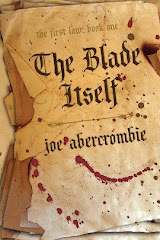.jpg)


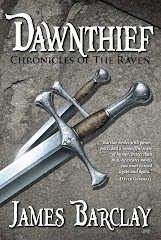
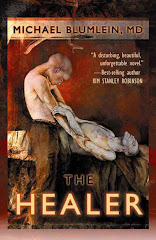
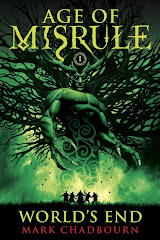.jpg)
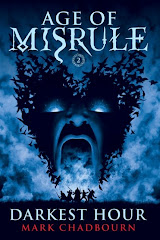

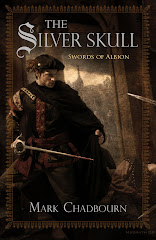


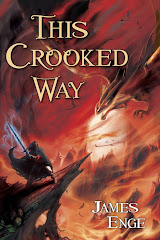
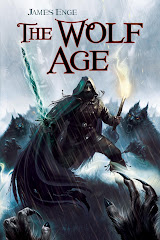


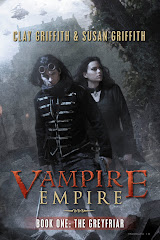
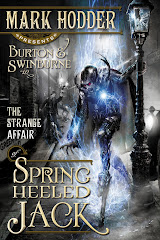


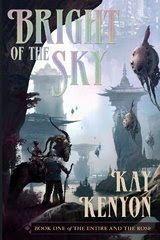.jpeg)
.jpg)
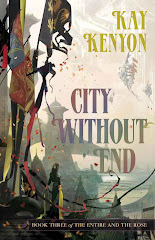


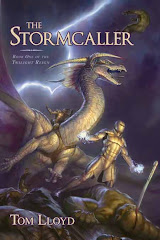

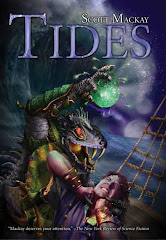

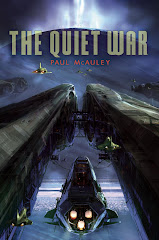



.jpg)




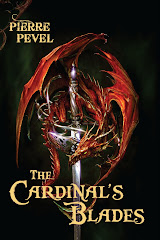



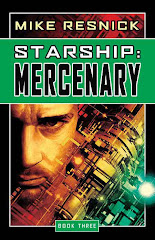

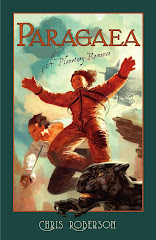



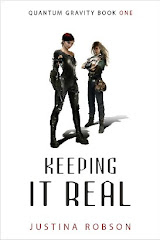.jpg)
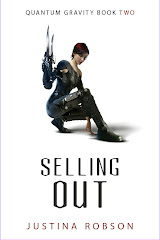
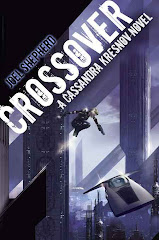
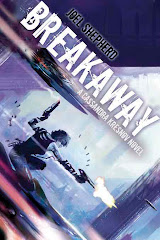
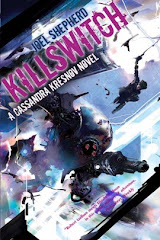.jpg)

